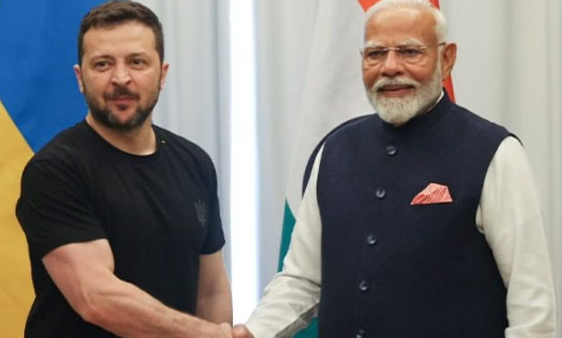Indian Prime Minister Narendra Modi is set to visit Ukraine on August 23, 2024, marking a significant moment in India’s diplomatic engagements amid the ongoing Russia-Ukraine conflict. This visit, his first to Ukraine since the war began in 2022, comes at a time when the geopolitical landscape is increasingly complex and fraught with tension. Modi’s trip is seen as a crucial step in reinforcing India’s role as a mediator and its commitment to promoting dialogue over military action in global conflicts.
Context and Timing of the Visit
Modi’s visit to Ukraine follows closely on the heels of his meeting with Russian President Vladimir Putin in Moscow. This earlier meeting, which took place in July 2024, sparked global debate and criticism, especially from Ukrainian President Volodymyr Zelensky. The images of Modi and Putin engaging warmly, including hugging and sharing conversations, stood in stark contrast to the violence ongoing in Ukraine at the time. Zelensky, alongside many Western leaders, expressed disappointment, calling it a setback for peace efforts and a blow to Ukraine’s struggle against Russian aggression.
The timing of Modi’s visit to Ukraine is particularly notable. It coincides with a period of intense military activity, as Ukrainian forces have been making significant advances into Russian-occupied territories. These developments have surprised many of Kyiv’s allies, showcasing Ukraine’s resilience and tactical innovation. Modi’s visit is expected to address these developments and explore potential avenues for de-escalation and peacebuilding.
India’s Diplomatic Balancing Act
India’s stance on the Russia-Ukraine conflict has been one of careful diplomacy. Since the start of the war, India has refrained from condemning Russia outright, instead calling for a ceasefire and advocating for peace through dialogue. This position has been consistent with India’s broader foreign policy approach, which often seeks to maintain strategic autonomy and balance its relationships with major global powers.
India’s relationship with Russia is historically strong, with deep ties in defense, energy, and trade. The two countries have been close allies since the Cold War, and India continues to rely heavily on Russian military equipment. Additionally, India has increased its imports of discounted Russian crude oil, a move that has been scrutinized by Western nations as it provides Russia with a financial lifeline amidst sanctions and global isolation.
At the same time, India’s growing influence on the world stage has required it to engage more actively with other global powers, including those opposed to Russia’s actions. Modi’s visit to Ukraine is seen as part of this broader strategy, demonstrating India’s willingness to engage with all parties involved in the conflict and to offer its support for peace efforts.
The Visit’s Objectives and Implications
According to India’s Ministry of External Affairs, the primary objective of Modi’s visit to Ukraine is to discuss the “entire gamut of bilateral relations” with President Zelensky. This will likely include discussions on economic cooperation, defense ties, and humanitarian assistance, as well as exploring ways India can contribute to peacebuilding efforts in the region.
India has consistently maintained that diplomacy and dialogue are the only viable solutions to the conflict in Ukraine. During his visit, Modi is expected to reiterate this position and emphasize the importance of a negotiated settlement that respects Ukraine’s sovereignty and territorial integrity. However, the visit also serves as a message to the international community that India is committed to playing a constructive role in global affairs, even as it navigates its complex relationships with both Russia and Western nations.
Modi’s trip to Ukraine will be closely watched by global leaders and analysts, who will be looking for signs of how India plans to position itself in the ongoing conflict. Will Modi use this opportunity to push for a more active role in peace negotiations? Or will he continue to walk the fine line between supporting Ukraine’s right to self-defense and maintaining strong ties with Russia?
Indian Prime Minister Narendra Modi is set to visit Ukraine: A Broader Diplomatic Tour
Modi’s visit to Ukraine is part of a broader diplomatic tour that also includes a visit to Poland on August 21-22. This visit is significant as it will be the first by an Indian Prime Minister to Poland in 45 years. Poland, a member of NATO and a staunch supporter of Ukraine, has been deeply involved in providing military and humanitarian aid to Kyiv. Modi’s visit to Poland is likely to focus on strengthening bilateral ties, exploring opportunities for economic cooperation, and discussing regional security issues.
India’s engagement with Poland, a key player in the European Union, further underscores Modi’s commitment to strengthening India’s ties with Europe and playing a more active role in global affairs. It also reflects India’s broader strategy of diversifying its international partnerships and increasing its influence on the global stage.
Conclusion
Prime Minister Narendra Modi’s upcoming visit to Ukraine is a significant diplomatic move that reflects India’s growing role in global affairs. As the conflict in Ukraine continues to unfold, Modi’s visit will be an important opportunity for India to advocate for peace, strengthen bilateral relations, and navigate the complex dynamics of international diplomacy. The world will be watching closely to see how India balances its strategic interests with its commitment to promoting dialogue and resolving conflicts through peaceful means.





